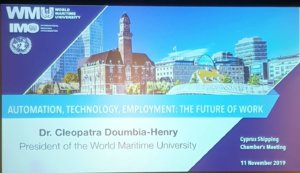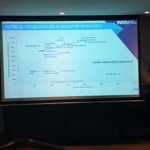CSC November’s Members Meeting
20.11.2019

CSC November’s Members Meeting
This time the meeting was held at Mediterranean Hotel in Limassol on 11th November, 2019. Traditionally it was opened with the monthly report presented by Vice-President of the Cyprus Shipping Chamber, Mr. Andreas Neophytou. The V-ce President spoke about the present achievements of the Chamber. And so, the Members were informed that:
- the President of the Chamber, Mr. Philis Philippos was unanimously elected as Vice-President of the European Community Shipowners’ Associations,
- the Board of Directors member – Mrs. Despina Panayiotou-Theodosiou, was re-elected as the President of WISTA International.
Taking this moment into advantage, the Company would like to congratulate both Member on their choice for such honorable positions. We hope that thanks to this, the good name of Cyprus shipping will be spread arount the world, not just only in Europe. We wish you good luck.
Then Mr. Neophytou, has introduced the main topic of the second part of the meeting – „Transport 2040”, delivered by Ms. Cleopatra Doumbia-Henry, the President of the World Maritime University. In her presentation she focused on the matitime sector.
The maritime industry is a traditional business. Shipping has been done over uncounted decades, transporting goods and people, exploring, leisure and research. New major trends like sustainability, demographic change, urbanisation, globalisation and information technologies have alkready touched the shipping industry, and forced the whole industry to rethink its strategies. In the world of:
- fast moving developments in data processing,
- a worldwide connection between cities and countries – phisically and digitally,
- an all-time pressure on costs,
digitalisation, as a process, become a key word for maritime companies. New processes for transport, such as multimodality, will only have sense with digitalisation. Goals can be reached and expanded by gathering, analysing and understanding data. With rising of digitalisation, there will be a growing demand for computer and mathematics experts as well as for engineers. The World Economic Forum points at Architecture and Engineering jobs as one with the biggest growth rate, next to jobs in the field of Computer and Mathematics. In the changing business area, required skills are changing as well. Based on the report „Transport 2040. Automation, Technology, Employment – The future of work”, Mrs. Doumbia-Henry has presented top 10 skills in 2040: complex problem solving, critical thinking, creativity, people management, coordinating with others, emotional intelligence, judgement and decision-making, service orientation, negotiation, cognitive flexibility. She pointed, that the report notes that new technologies and automation are impacting transport sector workers through both the displacement and creation of jobs, and may result in difficult transitions for many employed in the transportation sector. The future of work needs to ensure that workers are suitably qualified and re-trained to effectively master new technologies and higher levels of automation. The last two are some of the most important challenges facing workers today. Then she focused strictly on the executive sumamry of the report: „The world is interconnected through global trade on the basis of a transportation industry striving to be more and more efficient. Every year 62.7 trillion tonne-miles of cargo are transported around the world. At the same time, new technologies and automation are displacing some jobs and creating new ones, thereby impacting employment in general. This has led to a wide discussion about the consequences of automation and technology and the effects that this may have for society at large. Governments, the business sector, trade unions, regulatory bodies and other stakeholders have a keen interest in the discussion of what the consequences of the Fourth Industrial Revolution will be, and how society at large can be prepared for the transformations that may arise from further introduction of advanced technologies and automation. This report is intended to address the issue of how transportation will change as a result of more technologies and automation. The study that provided the data for this report is the result of intensive research conducted by an interdisciplinary team of experts with input from academia, industry and regulatory bodies during the last 18 months. The research undertaken forecasts and analyses trends and developments in all four modes of transport up to 2040 with a special emphasis on jobs and employment. This report is based on four pillars: a forecast of technologies; a forecast of global trade and transport; an analysis of the labour force involved in transport; and the development of country profiles that can be used to illustrate the local context for the introduction of technology and automation in a specific country. In this report, we conclude that the introduction of automation in global transport will be evolutionary, rather than revolutionary. While it affects mainly medium- and low-skilled groups, technological change is impacted by local factors. Despite high levels of automation, qualified human resources with the right skill sets will still be needed in the foreseeable future.”
For more specifi data, we suggest you to read the report. Here you can find it.





